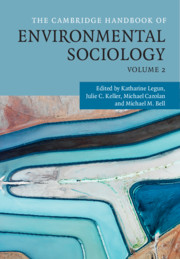Book contents
- The Cambridge Handbook of Environmental Sociology Volume 2
- The Cambridge Handbook of Environmental Sociology
- Copyright page
- Contents
- Figures
- Tables
- Contributors
- Foreword
- Introduction
- Part I Methods
- 1 Re-compos(t)ing the Ghosts of Sociologies Past: Towards More Cosmoecological Sociologies
- 2 On Discourse-Intensive Approaches to Environmental Decision-Making: Applying Social Theory to Practice
- 3 Community-Based Research
- 4 Using Geographic Data in Environmental Sociology
- Part II Embodied Environmental Sociology
- Part III Beyond the Human
- Part IV Sustainability and Climate Change
- Part V Resources
- Part VI Food and Agriculture
- Part VII Social Movements
- Index
- References
4 - Using Geographic Data in Environmental Sociology
from Part I - Methods
Published online by Cambridge University Press: 05 November 2020
- The Cambridge Handbook of Environmental Sociology Volume 2
- The Cambridge Handbook of Environmental Sociology
- Copyright page
- Contents
- Figures
- Tables
- Contributors
- Foreword
- Introduction
- Part I Methods
- 1 Re-compos(t)ing the Ghosts of Sociologies Past: Towards More Cosmoecological Sociologies
- 2 On Discourse-Intensive Approaches to Environmental Decision-Making: Applying Social Theory to Practice
- 3 Community-Based Research
- 4 Using Geographic Data in Environmental Sociology
- Part II Embodied Environmental Sociology
- Part III Beyond the Human
- Part IV Sustainability and Climate Change
- Part V Resources
- Part VI Food and Agriculture
- Part VII Social Movements
- Index
- References
Summary
The goal of this chapter is to provide an overview of how environmental sociologists can use spatial data and analytical techniques to advance environmental sociology. This chapter begins with the premise that individuals are embedded within specific environmental contexts and, consequently, spatial data and analyses are tools that help identify environmental forces relevant to human society. We assert that the environment is inherently spatial, and that the explicit consideration of one location relative to another is a distinguishing feature of “spatial” studies. This chapter begins with an overview of general definitions, and foundational theoretical and methodological concepts. We then highlight compelling spatially-explicit work in the environmental sociology literature on migration, land use, environmental justice, sustainable livelihoods, and poverty. Finally, we conclude with a discussion of future possibilities to enhance theories on human–environment interactions by incorporating spatial data. Our overarching aim is to elucidate the relational nature between locations, the environment, and human-environment processes in order to encourage the use of spatial tools and to promote new ways of thinking spatially.
- Type
- Chapter
- Information
- The Cambridge Handbook of Environmental Sociology , pp. 61 - 84Publisher: Cambridge University PressPrint publication year: 2020

